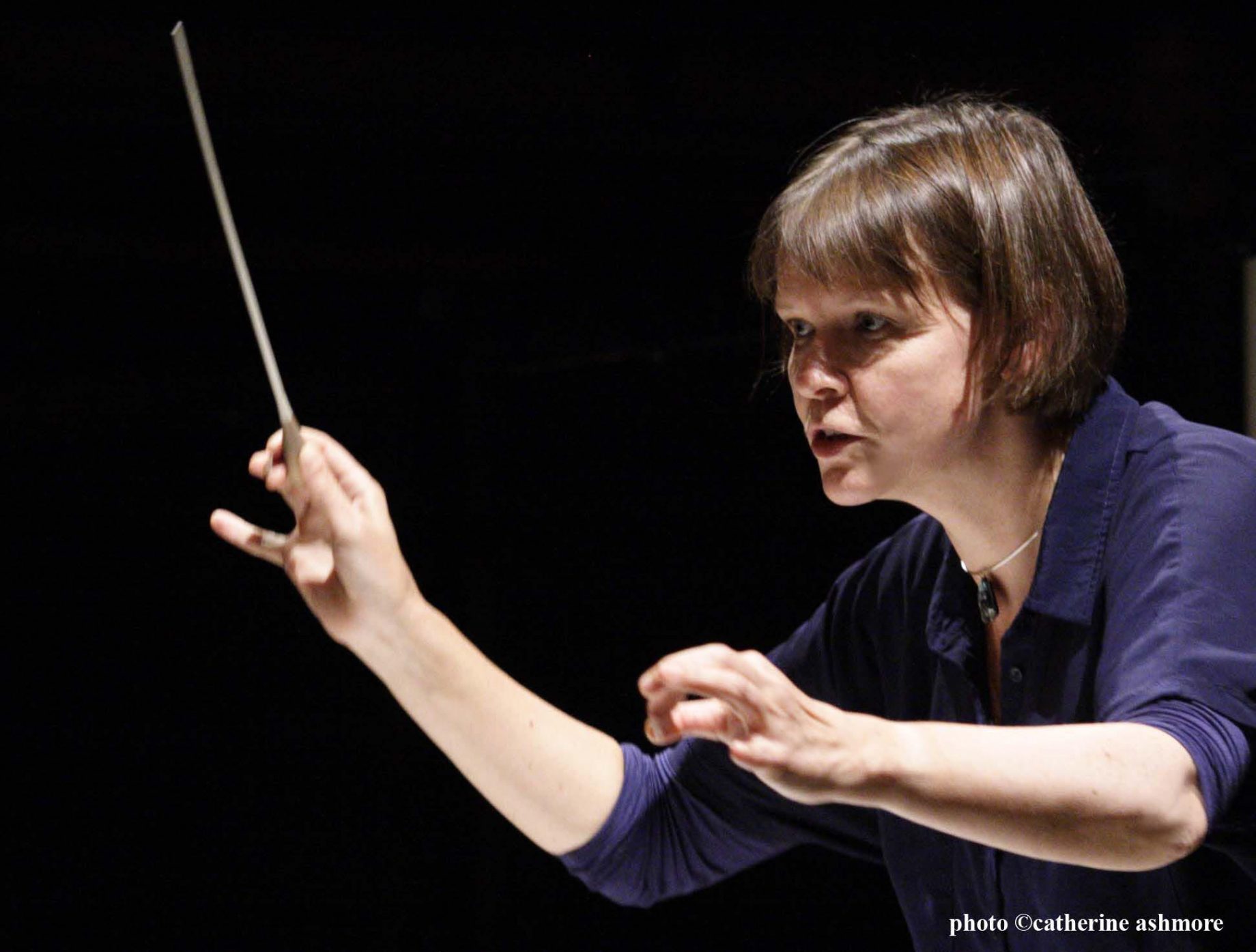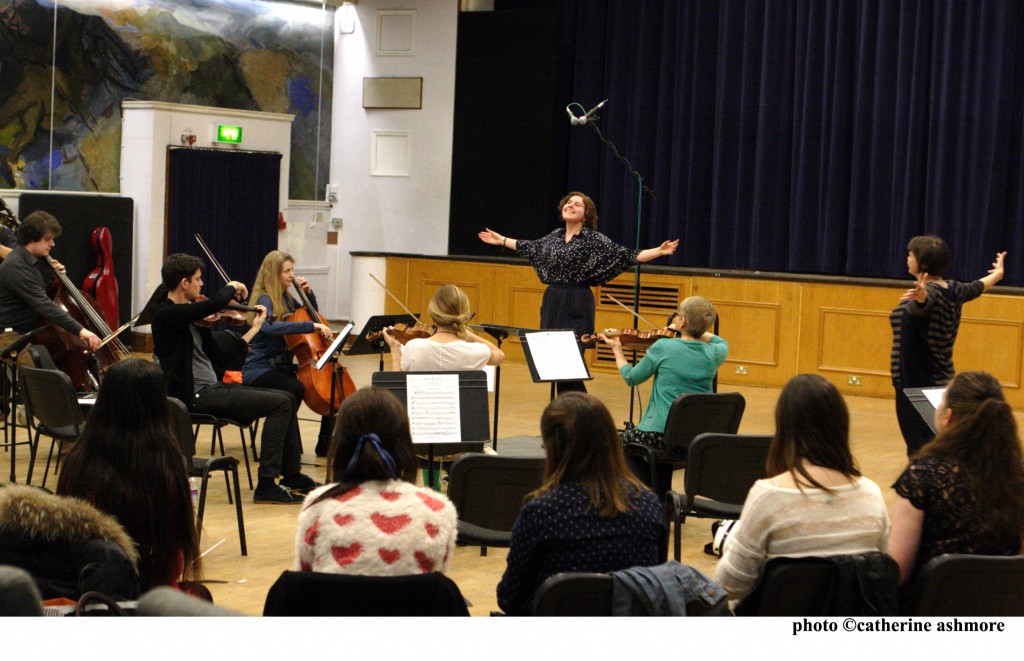
The musician and conductor Alice Farnham spoke to us about being a conductor, and the new courses for young women that she is giving at Morley College in Great Britain.
The courses are designed to get more girls and women interested in conducting.
When did you start playing an instrument?
I started learning to play the trumpet when I was 9 years old. I didn’t start learning to play the piano until I was 11 years old, which is late for professional musician. My family is very muscial, and my dad was a clergyman so there was a lot of singing in the choir
And when did you know you wanted to be a professional musician?
I went to university to study music, but I wasn’t sure if I would become a professional musician, as I was lacking in confidence. The first main instrument that I played was the organ, which is slightly unusual. If one wishes to go play in an orchestra, it can be an advantage to play a more common instrument such as a string instrument. Orchestras have a lot more musicians playing instruments like the violin, cello, double bass or the flute!
I have always enjoyed the social side of music. Instead of playing the piano alone, it can be a lot of fun to play with others, to bring people together, even at an amateur level.
When did you start conducting, and what made you decide to start?
While I was at uni, I had to conduct the choir, which I didn’t like at first, but gradually I found that enjoyed it more than playing the organ. This change of heart happened over a period of a few years.
When I finished university, I went to study in St Petersburg, Russia, and that was the moment when I knew that conducting was what I wanted to do.
When is the best time to start?
Some people know from a young age that they want to be a conductor, and work towards this aim. Others come to the profession later. Lots of competitions encourage young people to go into conducting from a young age. If this is what you want to do, then you need to decide on being a professional musician, so work towards that first.
How do I become a conductor?

Every conductor has a different story, and you don’t have to follow a certain chronological order or career path. First, you need to have the standard of a professional musician, which means full time study for 3 or 4 years. You have to be able to play your instrument to a high standard. You need to show that you know how music works, and that comes from training.
Get a group of musicians together and practice, practice, practice. Put on a concert, get some experience.
What is the most amazing experience you have had when conducting?
Just last year, I had two amazing experiences. The first was with the Welsh National Youth Opera, conducting an opera by Benjamin Britten in the Wales Millenium Centre, with Only Boys Aloud. It was wonderful to work with the cast and crew, from the singers to those working backstage – the commitment and the dedication was incredible.
Then for the first time since I studied in Russia, I went back to St Petersburg to conduct another Benjamin Britten opera in the Mariinsky Concert Hall, which was very exciting.
It is the good thing about the job – it is very varied. Most conductors work freelance, as there aren’t many full-time jobs in this profession. Many musicians teach music in the initial stages of their career, until they find more work in conducting. I still work as a prompter occasionally, which good fun and gives me the opportunity to see and hear the best conductors and orchestras in the world.
You teach at Morely College – What course do you teach?

In September Marion Allsop conducted the Last Night of the Proms, the first woman woman to do so. It got a lot of us musicians thinking about the fact that there were still very few women in conducting. When I went to college, I thought that things would improve in time, but over the past few years it hasn’t really done so.
I run an opera course at the adult education college, Morley College, and so I suggested running some programmes to encourage young women, to get them thinking of a career as a conductor. When I speak to female musicians about being a conductor, I often hear ‘I wanted to do it, but I didn’t see any women doing it’.
The plans are to run workshops around the country for women between 16 and 25 years, who are already professional musicians or who would like to be. They have been nominated from their conservatoire (music college). Most have them haven’t even thought about conducting, but are trying it out and are eager to learn the basic principles of conducting. They might not all become professional conductors, but the lessons will be useful for their lives in the music profession.
What lessons do you teach women that might not be taught to men?
We are working on body language, and have a stage craft coach Alma Shearen, to look at the way you carry yourself, and the way you speak. She works with them on voice production, on speak confidently and calmly. It is the kind of thing that I wish I’d had that when I was that age.
We also talk about clothing. You don’t want to distract from the music, which is why orchestra players wear black but it can be quite difficult to find an outfit. Men don’t have this problem – most conductors wear a tailcoat, and look well dressed.. Women conductors want to wear clothes that make them feel good, and still allow them freedom of movement.
I am also very conscious that you have your back to the audience for a long time. My hairdresser always laughs because I am the only person who cares when they are showed the back of their head in a mirror!
Some conductors are reserved, others more flamboyant. How do you choose?
I think it come down to personality. It is really important to be true to yourself, to be either reserved or flamboyant. It is also a bit of an age thing – when you look at clips of very famous conductors, they were more active and demonstrative when they were younger. As they get older, they don’t need to throw themselves about as much, the orchestra knows them and respects them. They almost ‘condense’ their technique into smaller movements.
The traditional impression of a conductor as an authoritative, sometimes even slightly bullying figure is changing. We are becoming more democratic and conciliatory, and having more women in the profession can help men be less aggressive – and for women to be more assertive, so we can learn from each other. I’d like young women to have more of the bravado that young men often have, to think ‘Oh, yes. I will give that a go!’
What is the most difficult thing to learn about conducting?
When you learn an instrument, you can stand all on your own and practice. With conducting there is a bit of technical practice, but the real moment of truth comes not in private, but in front of musicians, and then often you are judged quite harshly. Getting practical experience is really quite tough – and it is something that some orchestras are not sympathetic enough to this dilemma.
Are there programmes for boys as well, or is this just for girls?
The programme we are running is just for girls. There are lots of workshops for both genders, perhaps not for this age, but from undergraduate onwards, there are lots of courses available. Most music colleges will have conducting lessons. The idea with this course is to encourage girls and women to look at conducting as a career.



